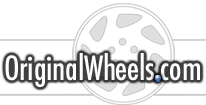“Our wheels will spin straight, round, and true!” That’s a phrase we like to say quite often, because we mean it! But what exactly do we mean by that?
Whenever we go out and purchase used OEM wheels for our inventory, we like to put them on a wheel balancer in order to see just how straight they spin. Generally, we don’t like to sell rims that spin at more than 35,000s of an inch – and this number just refers to how close a wheel is from being perfectly straight. It should be mentioned that no wheel will spin perfectly straight, simply because there is no such thing as a “perfect” wheel. Even brand new wheels from the dealer will often spin at 10k, or 10,000s of an inch away from perfection.
Why is it so important to measure a wheel’s “roundness”? Well, if a wheel has too much runout – another way of saying the wheel is bent – this causes a hop, wobble, or vibration when driving your car. This runout can come from any part of the wheel, such as the lip or barrel, but most bends tend to occur on the back side of the wheel. So, if you’re replacing one of your factory Scion tC rims, just make sure that the replacement spins straight to avoid any issues!
To help balance out your wheels, you can use what are known as wheel weights. Wheel weights are accessories that you can put on your wheels to balance them out while the tire is mounted; since the tire is not perfect either, the wheel weights work to balance the tire and wheel together. There are a couple of different ways wheel weights can be applied on a wheel: some are adhesives, so you can just slap them inside the barrel and call it good. Others are clipped onto the lip.
How much bend is TOO much?
Sometimes, a wheel can have really excessive runout to the point where even wheel weights won’t help. If you’re driving on a bent wheel and feel uncomfortable with the ride (too much vibration, wobble, etc.), then it may be time to look into getting the rim fixed or replaced.
Driving on a bent wheel isn’t necessarily dangerous, but it’s not good either. Depending on the location of the bend, it could cause leaking in your tires. Additionally, since bent wheels do have a wobble or hop, the tires on the out of round rims will have uneven wear. I don’t know about you, but rather than deal with the extra wear and tear to my tires and drivetrain, I’d want to just tackle the source of the problem: the bent wheel.
How can I get my wheel fixed? Is it worth it?
There are many shops that specialize in repairing factory wheels, including us! Unfortunately, while most wheels can be repaired/straightened – some cannot, and this depends on a variety of factors. For example, the wheel lip could be too thin or you could be dealing with a cracked bead seat, and both of these factors can make a wheel too dangerous to repair.
There’s also the issue of price. It could be possible to repair a bent wheel, but the cost would be even higher than it would to replace it. So, in the end, sometimes it just doesn’t make much financial sense to get something fixed when you can just replace it for cheaper.
Like I mentioned earlier, we like to inspect every wheel before adding them to our inventory, and we make sure we pick wheels that do not have too much runout. We think this saves everyone the hassle from having to add wheel weights, or possibly causing further damage to a wheel by trying to straighten it. So, if you order from us, rest assured knowing you’ll have straight, round, and true wheels.
Hope this “straightens” things out!
– Kathy
OriginalWheels.com
